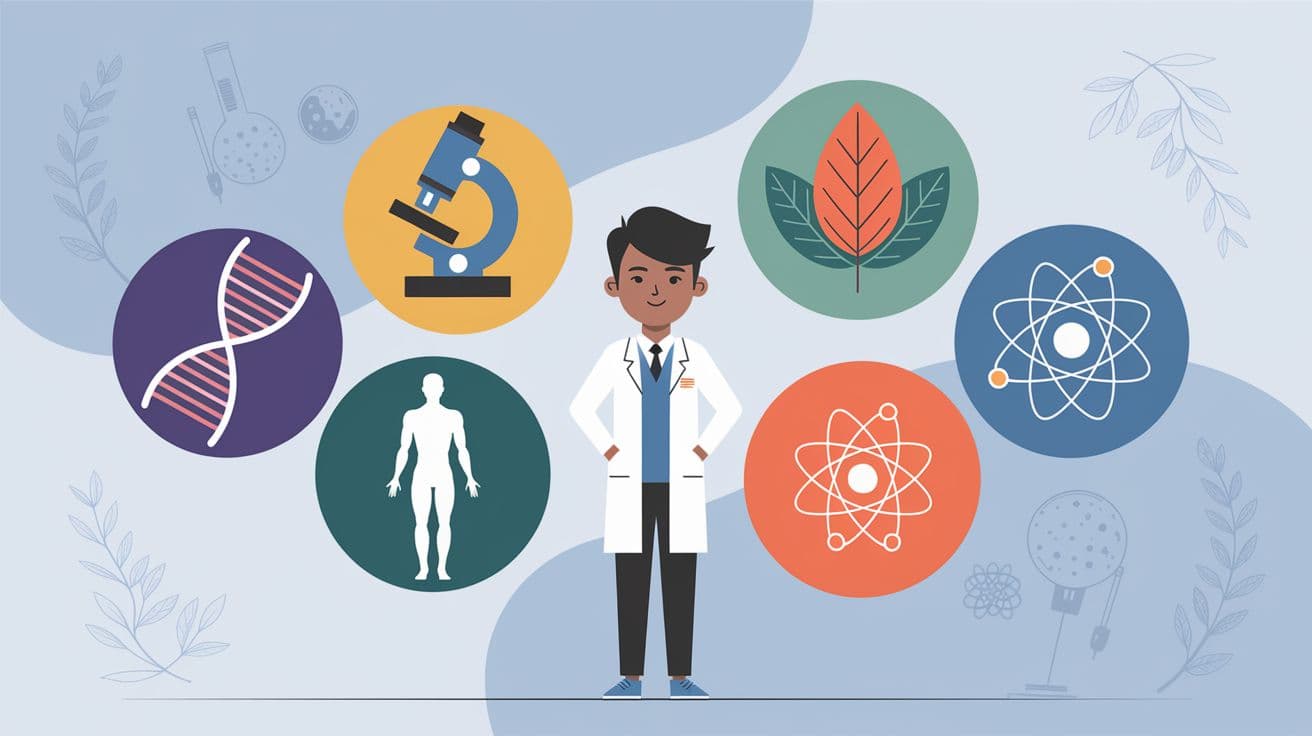Ever been curious about how plants grow? How does your body resist and react differently to diseases?, or how scientists create life-saving medicines.
If yes, then welcome to the world of Life Sciences!
Life Sciences Courses provide an intriguing study of living things - from small microbes to gigantic trees, harmless animals to intelligent human beings.
Life Sciences Subjects aren’t simply about biology lessons that you may have learned in school, it goes much further, much deeper, into fields of health, conservation of the environment, genetics, biotechnology, and much, much more. Life Sciences is a very wide umbrella with many branches, all affecting our lives and the future of the world in ways you could never have even imagined, well, until now, because we are going to explain it all to you, digging deeper into the various branches of Life Sciences, finding interesting career options, and why this industry is evolving faster than ever before!
Now, enough rambling, let’s dive right in! Whether you’re just finishing school or exploring career options, understanding the key Life Sciences subjects can open up endless possibilities.
What is Life Sciences?
Let’s get into it! Life Sciences is the science of Life! But what is Life Sciences exactly? And why is it so important?
Everything that lives - how they function, develop, change, and interact with the environment around them, all that is covered in life sciences subjects. So, when you learn Life Sciences, you basically learn the history of life itself
Now, here’s the real thinker: Why should you be interested in Life Sciences? Well, it is solving the world’s largest issues today - by creating new medicines, saving endangered species, and enhancing agriculture. Life Sciences breeds innovation in medicine, conservation, and technology.
But wait, it gets better. Life Sciences is really interdisciplinary. You won’t be just studying biology, but integrating chemistry, physics, mathematics, computer science and even engineering depending on what you choose to do. It’s truly a melting pot of sciences, uniting to uncover the secrets of life.
Read More: What are the Subjects in Science Stream in Class 11?
List of Life Sciences Subjects
There are a number of interesting Life Sciences Subjects to specialize in. So, let’s take a stroll through the main ones you’ll be exposed to, one by one, in the List of Life Sciences Subjects:
Biotechnology
Welcome to Biotechnology, where science and technology meet in a way like they never have before! It is all about using living systems to create new technologies and products. Consider things such as genetic engineering, gene editing, vaccines, and artificial meat. So, if you’re passionate about innovation, Biotechnology is the way to go, turning science into solutions.
Microbiology
This field digs deep into the microscopic universe of bacteria, viruses, fungi, and other microorganisms. These microbes are omnipresent, that is, present everywhere. They are in your gut, in the soil, in oceans, and even in extreme environments. In Microbiology, you’ll learn how they impact health, the environment, and industries like food and pharmaceuticals.
Genetics and Genomics
This is the field for you if you’re interested in DNA, how traits are passed, what is hereditary and what isn’t, yada yada. Genetics study how genes work and what happens when things go wrong, while Genomics digs a little deeper into entire sets of genes, helping in personalized medicine and agriculture.
Zoology
Do you like animals? Good, then Zoology is the subject for you. It’s all animal biology, animal habits and habitats. You’ll learn about wildlife conservation, animal health and even veterinary science or research.
Read More: How to Become a Wildlife Biologist in India
Botany
Plants are quite fascinating too, and botany will tell you why. As one of the classic branches of Life Sciences, you’ll learn about plant life, from algae to giant trees. Its applications include agriculture, forestry, medicine and climate science.
Molecular Biology
Molecular Biology peers within the cell to look at how biology molecules like DNA, RNA and Proteins react with each other. So, if you enjoy working in a laboratory and finding out about life on the tiniest level, this is where to come.
Environmental Science
You’ll be studying all about ecosystems, biodiversity, conservation and sustainable processes. It’s an excellent option if you want to fix global warming and save the world.
Immunology
The human body contains incredible defense systems, and immunology is where you learn how they work. It is a critical field for vaccine development, fighting disease, and even developing new therapies like cancer immunotherapy.
Biochemistry
And lastly, and appropriately titled as well, this is where Chemistry intersects with Biology. This field is concerned with chemical reactions in living organisms and is essential for applications in medicine, genetics and molecular biology.
Emerging and Specialized Areas in Life Sciences Courses
The deeper you go in Life Sciences, the more awesome and niche areas will be waiting for you:
- Bioinformatics
- Neuroscience
- Biomedical Engineering
- Agricultural Science
- Marine Biology
- Astrobiology
Educational Pathways
If you’re excited about Life Sciences, there are plenty of ways to start your journey:
Undergraduate Courses:
- B.Sc Life Sciences
- B.Sc Biotechnology
- B.Sc Microbiology
- B.Sc Zoology
- B.Sc Botany
Postgraduate Specializations:
- M.Sc in Genetics
- M.Sc in Environmental Science
- M.Sc in Biochemistry
- M.Sc in Molecular Biology
- M.Tech in Biotechnology
- M.Tech in Biomedical Engineering
- MBA in Biotech Management
Top Institutions:
- India: IISc Bangalore, AIIMS Delhi, IITs, Delhi University.
- Abroad: Harvard University, Stanford University, University of Cambridge, MIT
You can pretty much do anything you want with Life Sciences Courses.
Career Opportunities in Life Sciences
And now to the multi-million dollar question - how much can you earn with a Life Sciences degree? Surprisingly, a lot!
Graduates with a B.Sc Life Sciences can work in various fields, depending on their chosen branches of Life Sciences.
- Research Scientist: Work in labs and invent the next big breakthrough.
- Biotech/Biomedical Engineer: Design medical devices, prosthetics, and biotech products.
- Genetic Counsellor: Counsel families with genetic disorders.
- Environmental Consultant: Make firms go green and save ecosystems.
- Forensic Scientist: Apply biology and chemistry to solve crimes.
- Healthcare Professional: Work in diagnostic, pharma, or public healthcare.
- Teaching and Academia: Mold the next generation of Life Sciences enthusiasts.
Growth Trends and Future Prospects
Life Scenes are booming, and if you enter this field, you’re entering in molding a new future:
- AI, Machine Learning, and Big Data are revolutionizing research.
- Personalized Medication is becoming the standard
- Biotechnology is finding answers to big problems, from vaccine development to green plastics.
- Environmental Science is more critical than ever with climate change challenges.
Basically, the demand for Life Sciences experts is only going to grow. If you’re passionate and curious, there’s no better time to jump in!











